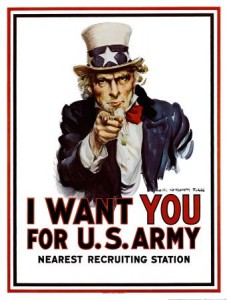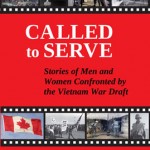
By: Jake Prosnit (History, Class of 2012)
On Thursday, April 19th, Trinity was treated to a Common Hour lecture, “Called to Serve: Stories of Men and Women Confronted by the Vietnam War Draft,” from Tom Weiner. Author of Called to Serve: Stories of Men and Women Confronted by the Vietnam War (An interview with Tom from Junior Lydia Kay is below), Tom Weiner graduated Trinity in 1971 and his time at Trinity, specifically December 1st, 1969, the night of the draft lottery, is the backdrop of his book. His work tells the story of 30 men and women (even though he interviewed 61) and their memories of being called to serve in Vietnam. Tom Weiner was successful in making the Common Hour less of a lecture and more of a discussion with his audience. He invited Peter Jessop class of 1976 to share some thoughts on Vietnam and Tom’s book. A conscientious objector of the Vietnam War, Peter spoke about the night of the draft lottery (he was #85) and eagerly awaiting the announcement in North Campus (my current dorm). His whole interview is documented in the book. Another Trinity notable, Dr. George Higgins, a 40-year employee of the College, also shared thoughts about being at Trinity during Vietnam and his special role in counseling and diagnosing students.
During the question and answer session we heard from other men about this significant time. Bob Brown (#227), another interviewee in Weiner’s book, spoke about his challenges of being an African-American male and possible draftee. His line, “Vietcong never called me a nigger,” struck the audience and gave a different perspective to the many already offered at the lecture. Finally, Michael Heaney and Jack Chatfield,two former Trinity professors and Vietnam veterans, closed out the discussion with poignant memories from those years reinforcing how heavy these decisions were for young males.

Interview with Tom Weiner by Lydia Kay ’13 (The Trinity Tripod, April 2012)
 “Tom Weiner, graduate of the class of ’71 will be hosting a common hour event this upcoming week, on Thursday, April 19, to discuss his recently published book entitled, Weiner experienced the draft for the Vietnam War in 1971 just after graduating from Trinity. Though he didn’t end up enlisting due to medical reasons, the process of being called to the draft had an extreme impact on him. He currently resides in Northampton, Mass., where he has worked as a sixth grade teacher for the past 25 years. Weiner enthusiastically agreed to participate in an interview for the Tripod in order to create more awareness within the Trinity community about his book’s message. He is a social justice activist who is adamant about addressing issues of fairness in his work and community. After seven years of research and attaining upwards of 61 interviews, 30 of which are included in his book, Weiner’s final publication includes commentary on the fundamental issue of the draft in our country and its emotional and social consequences. His hope is that the book will help educate high school and college students about the repercussions the Vietnam War has, and continue to have, on our older generation.
“Tom Weiner, graduate of the class of ’71 will be hosting a common hour event this upcoming week, on Thursday, April 19, to discuss his recently published book entitled, Weiner experienced the draft for the Vietnam War in 1971 just after graduating from Trinity. Though he didn’t end up enlisting due to medical reasons, the process of being called to the draft had an extreme impact on him. He currently resides in Northampton, Mass., where he has worked as a sixth grade teacher for the past 25 years. Weiner enthusiastically agreed to participate in an interview for the Tripod in order to create more awareness within the Trinity community about his book’s message. He is a social justice activist who is adamant about addressing issues of fairness in his work and community. After seven years of research and attaining upwards of 61 interviews, 30 of which are included in his book, Weiner’s final publication includes commentary on the fundamental issue of the draft in our country and its emotional and social consequences. His hope is that the book will help educate high school and college students about the repercussions the Vietnam War has, and continue to have, on our older generation.
LK: What motivated you to write this book in the first place?
TW: I had experienced the war and draft first hand while at Trinity from ’67-’71. My political and moral awakening was occurring through participation in the issues of the day at Trinity: protests to get more black student scholarships and demands for African-American Studies, the push for co-education, making changes to the curriculum and requirements and, perhaps most significantly, anti-war efforts. My experience [with the draft] definitely had a major effect on my psyche and spirit–creating a conscientious objector application, pursuing possible medical deferments, the stress and anxiety of the uncertainty of the lottery, watching a best friend two years ahead of me at Trinity enlist in the Marine Reserves and suffer the humiliations of basic training, seeing a veteran of the war at Trinity and what a shell of a person he’d become, and then receiving a low number which meant I would be called to serve even before I graduated. What happened, which I write about in the introduction, has had a significant impact on me in many ways.
LK: How was the process of interviewing others who were affected by the draft?
TW: I was able to make the necessary time and the even more necessary connections to find upwards of 61 interview subjects. Early on I realized that the book needed to be inclusive of all of the kinds of experiences possible to young men of my generation. I did not find any books that brought the varied decisions into one volume. Because of this, there are chapters entitled: “Those Who Served,” “Those Who Left,” “Those Who Resisted,” “Those who chose Conscientious Objection,” “Those Who Beat the Draft and, since I came to realize that the stories of women who the draft and war effected also needed to be included, “Those Who Loved, Counseled and Supported.” When I found someone who I had heard had enlisted to escape the draft with his low lottery number, I knew I needed those types of stories in the book along with those who were drafted and chose to serve.
LK: What was the most satisfying part of the writing experience?
TW: Conducting the interviews was definitely the most satisfying part of the process as my subjects invariably shared their memories, their choices and decisions, their feelings about what they did then and now and their awareness of the role the war and draft played in their lives. There were almost always tears. I encouraged them to tell the story in its fullness so the reasons for the choices they made would become apparent to the reader. I felt honored to be the recipient of such powerful and moving tales from a time, the 60s, when there was so much turbulence in our society.”
Read Full Interview HERE.